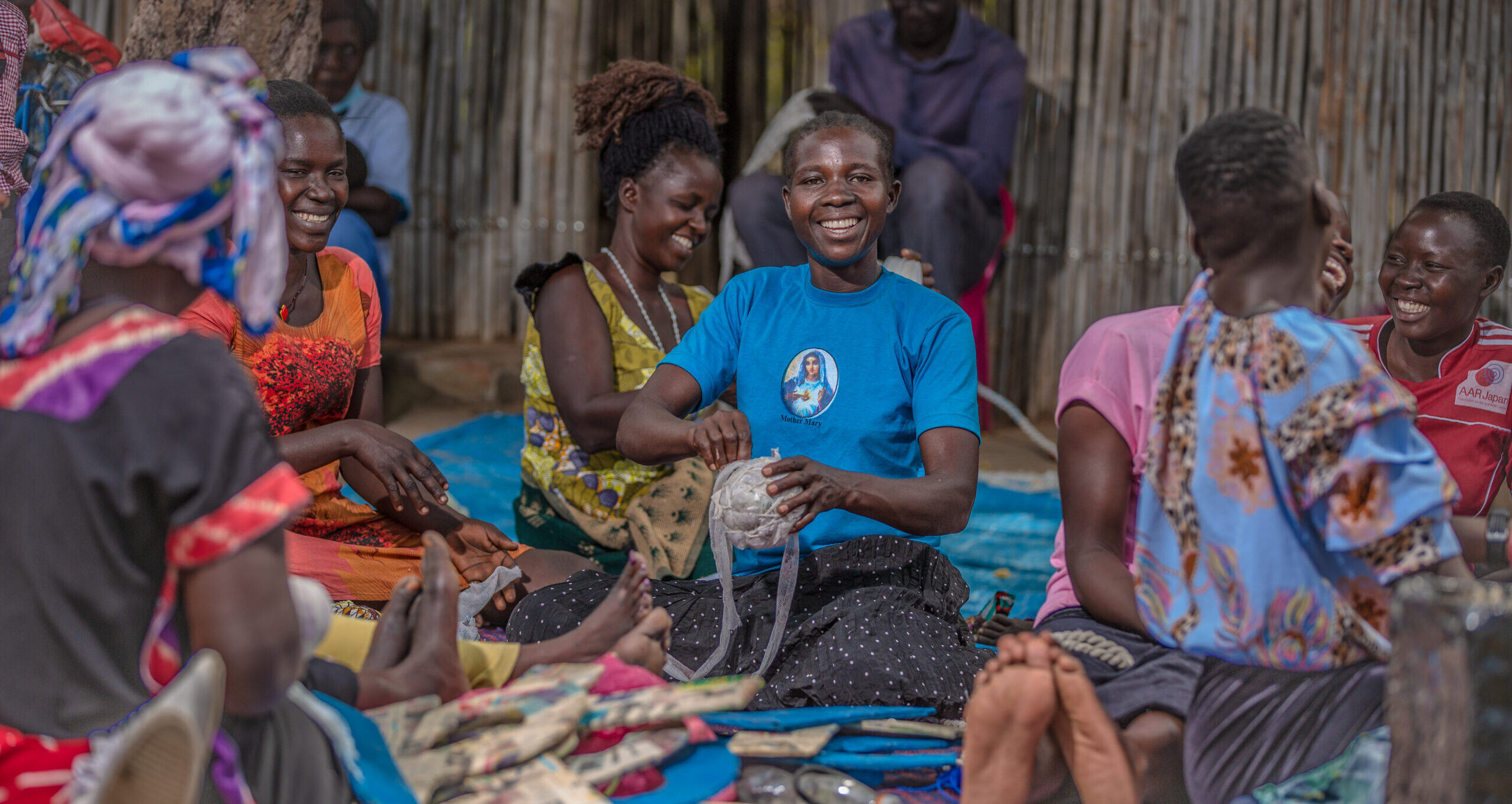From refugee to educator: How play heals two generations in Uganda
Discover how Hakim, a refugee from South Sudan, became an educator supporting refugee children sheltering in Uganda.

BY Edwinah Nassuna and Nazifa Raidah
Hakim’s journey to becoming an educator began on a narrow dirt road near the border of South Sudan and Uganda. It was September 2016, and Hakim, along with his young family, spent days navigating jungles and slipping through back roads, avoiding checkpoints that intercepted young men, demanding that they join the war in South Sudan.
The family eventually made it to safety in Uganda and were first taken to the Ocea reception center. A hot meal, some medicines, blankets, and other necessities were provided to them. Three weeks after reaching the Rhino settlement, the family—Hakim, his wife and three children, and his mother—moved to a small plot of land allocated to them in the camp. Hakim took on farming but the income was not enough to meet their needs. He wanted to do more, for himself and his family.
Invest in the potential of people like Hakim.
A turning point: Discovering loss and uncertainty among children
At the Rhino refugee settlement, Hakim saw first hand the pressing needs of children, much like his own, affected by displacement and conflict. Uganda hosts the highest number of people displaced, with an average of 2,500 people arriving every week, primarily driven by ongoing conflicts and climate-related challenges. In fact, six out of every 10 children in Uganda are refugees.
In the sprawling Rhino settlement, Hakim saw children lost and terrified and never having enough to eat. Hakim wanted to do something. He joined as a caregiver for a non-profit organization working on child welfare. A few months on, he found out about a two-generation approach that BRAC was piloting in the camp.
Funded by the Conrad N. Hilton Foundation, the initiative runs across the northwestern refugee settlements in Uganda. It combines two proven approaches—the Play Lab model, where children gather to learn and heal through play in Humanitarian Play Labs, and the Graduation approach, that uplifts their parents and caregivers from the cycle of ultra-poverty.
The Graduation approach is a time bound, big-push investment that provides people with the resources, skills, and confidence needed to create a sustainable pathway out of extreme poverty.
Meanwhile, BRAC’s Humanitarian Play Labs offer play-based, community-driven early learning opportunities for children affected by conflict, to recover from trauma and learn and heal through play.
This initiative now comprises over 4,000 children from 700 households across the Imvepi and Rhino refugee camps where Hakim and his family have found a home. Hakim was recommended as a potential play leader through the Refugee Welfare Committee. With high hopes, he sat for interviews and was ultimately selected as a play leader for the Play Lab at Ocea C.
Support a refugee child to play, learn, and heal.
Supporting children to play and heal
Hakim understood how triggering the memories of war can be. He has worked every weekday since becoming a play leader in 2020. “Working with children is wonderful,” he says. He sees how, for these children, play is more than an activity. “It is a form of therapy that helps these young minds make sense of the world.”
Working with children is wonderful. It is a form of therapy that helps these young minds make sense of the world.”
The Play Lab where Hakim facilitates is a riot of colors and creativity. Parents and guardians come together to decorate its walls, make play materials that are local to their culture, and take turns in cooking meals for children. They also join parenting sessions that Hakim and his colleagues run.
The rigorous training that Hakim went through has equipped him with concepts relating to children’s holistic development, learning through play pedagogy and psychosocial support. He now applies them through designing play as a facilitator and co-player. Hakim recognizes that children come with both positive and negative behaviors, often without realizing the impact. “Children are not aware of these behaviors at times,” he says, “and cannot select themselves.”
In his classroom, he has seen children learn to coexist peacefully, learning Lugbara, the language of the host community, while forming bonds that defy the general stigma often placed on refugees. In this regard, Hakim’s Play Lab becomes a site for peacebuilding. Every morning, Hakim starts with a ‘news telling’ session, where children recount their experiences from home or on their way to school. This often prompts children to candidly share the struggles they live with.
Hakim remembers a young boy who often complained of stomach ache. At first, it seemed a minor issue, but upon visiting the child’s home, Hakim discovered that sorghum was often the only food his family consumed. The parents also fought every now and then, resulting in the children going to bed hungry. Hakim spoke to the boy’s parents about the implications of violence on children, and stayed in touch with the family over a period of time, until the child appeared healthier and more joyful.
Hakim is a trusted figure in the community, often invited to gatherings and events. Parents look to him as a partner in their children’s upbringing. He dreams of a day when all children living in conflict and displacement have access to quality education and a community that supports them.
In a world fractured by conflict, these Humanitarian Play Labs hold the key to giving the youngest learners a start that they deserve.
Invest in human potential and make a multi-generational impact.
Edwinah Nassuna is Communications Coordinator at BRAC Uganda and Nazifa Raidah is Deputy Manager, Events and Campaigns at BRAC International.